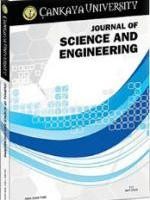Celal Bayar Üniversitesi Muradiye Yerleşkesi'ndeki Meşelikte Toprak Akarlarının (Acari) Dağılımı
Celal Bayar Üniversitesi Muradiye Yerleşkesi'ndeki Meşelikte Toprak Akarlarının (Acari) Dağılımı
Acari, soil mites distribution, Turkey,
___
- [1] W. Dunger, Tiere im Boden, A. Ziemsen Verlag, Wittenberg Lutherstadt 1983.
- [2] M. Luxton, Studies of the oribatid mites of a Danish beech wood soil. I. Nutritional biology, Pedobiologia 12 (1972), 434–463.
- [3] R. Schuster, Der Anteil der Oribatiden an den Zersetzungsvorg¨angen im Boden, Zoomorphology 45 (1956), 1–33.
- [4] J. A. Wallwork, Oribatids in forest ecosystems, Annual Review of Entomology 28 (1983), 109–130.
- [5] H. W. Mittmann, Zum Abbau der Laubstreu und zur Rolle der Oribatiden (Acari) in einem Buchenwaldboden, Dissertation, Fakultat fur Bio- und Geowissenschaften der Universitat Karlsruhe (TH), Ilmunud Karlsruhe 1980.
- [6] K. H. Forsslund, Beitr¨age zur Kenntnis der Einwirkung der bodenbewohnenden Tiere auf die Zersetzung des Bodens uber die Nahrung einiger Hornmilben (Oribatei), Meddelanden fran Statens Skogsforsoksanstalt 31 (1938), 99–104.
- [7] N. Ayyıldız, Erzurum ovası oribatidlerinin (Acari) bitki ortusu ve toprak yapısıyla iliskileri Turkiye I. Entomoloji Kongresi (13-16 Ekim 1987, Izmir) (1987), 621–630.
- [8] K. Koc ve N. Ayyıldız, Ataturk Universitesi Kampusu’ndeki ¸cam korulugunda oribatid akarların (Acari: Oribatida) dikey dagılımı, Turkish Journal of Zoology 16 (1992), 361–384.
- [9] N. Ayyıldız ve K. Koc, Ataturk Universitesi Cam Korulugu’nda toprak akarlarının (Acari) dikey dagılımı uzerine bir calısma, XII. Ulusal Biyoloji Kongresi (6-8 Temmuz 1994, Edirne) 4 (1994), 160–166.
- [10] A. O. Kahveci, R. Urhan ve Y. Katılmı¸s, Honaz Dagı Milli Parkı’nda (Denizli) toprak akarlarının (Acari) dikey dagılımı, Journal of Arts and Sciences, 5 (2006), 31–38.
- [11] R. Urhan, Y. Katılmı¸s and A. O. Kahveci, Vertical distribution of soil mites (Acari) in Dalaman (Mugla prov.-Turkey), Munis Entomology & Zoology 3 (2008), 333–341.
- [12] J. A. Wallwork, The Distribution and Diversity of Soil Fauna, Academic Press, London, 1976.
- [13] A. Kocatas, Ekoloji ve Cevre Biyolojisi, Ege Universitesi Su Urunleri Fakultesi Yayınları, Izmir 2006.
- [14] G. O. Evans, The Terrestrial Acari of the British Isles: An Introduction to their Morphology, Biology and Classification, British Museum, London 1961.
- [15] B. R. Hutson and L. G. Veitch, Mean annual population density of Collembola and Acari in the soil and litter of three indigenous South Australian forests, Australian Journal of Ecology 8 (1983), 113–126.
- [16] A. I. M. Al-Assiuty, B. M. Bayoumi, M. A. Khalil and N. M. van Straalen, The influence of vegetational type on seasonal abundance and species composition of soil fauna at different localities in Egypt, Pedobiologia 37 (1993), 210–222.
- [17] V. G. Marshall, Seasonal and vertical distribution of soil fauna in a thinned and drea-fertilized douglas fir forest, Canadian Journal of Soil Science 54 (1974), 491–500.
- [18] M. J. Mitchell, Vertical and horizontal distribution of oribatid mites (Acarina: Cryptostigmata) in an Aspen woodland soil, Ecology 59 (1978), 516–525.
- [19] J. A. Holt, The vertical distribution of cryptostigmatic mites, soil organic matter and macroporosity in three North Queensland rainforest soils, Pedobiologia 22 (1981), 202–209.
- [20] J. Whelan, Acarine succession in grassland on cutaway raised bog, Scientific Proceedings, Royal Dublin Society, Series A 6 (1978), 175–183.
- [21] J. C. Perdue and D. A. Crossley, Vertical distribution of soil mites (Acari) in conventional and no-tillage agricultural systems, Biology and Fertility of Soils 9 (1990), 135–138.
- [22] B. Dik, F. Guclu, R. Cantoray, S. Gulbahce ve J. Stary, Konya yoresi oribatid akar turleri (Acari: Oribatida), mevsimsel yogunlukları ve onemleri, Turkish Journal of Veterinary and Animal Sciences 23 (1999), 385–391.
- [23] S. Banerjee, Seasonal variations of acari and soil nitrate, Acta Arachnologica 25 (1973), 37–40.
- Yayın Aralığı: Yılda 2 Sayı
- Başlangıç: 2009
- Yayıncı: Çankaya Üniversitesi
Moleküler Dinamik Benzetim Yönteminde Atom Sayısının Kristalleşme Süreci Üzerine Etkisi
Fatih Ahmet ÇELİK, Sefa KAZANÇ
Fidan Gelişim Algoritması Yardımı ile DNA Motiflerinin Keşfi
Murat Demir, Ali Karcı, Mehmet Özdemir
LBP Yardımıyla Görüntüdeki Kişinin Yaşının Bulunması
Vasif V. NABİYEV, Asuman GÜNAY
İç Mekanda Kullanılan Yapay Aydınlatmanın Kullanıcı Açısından Etkileri
Comparison of Sample Preparation Techniques Used in Luminescence Dating Methods
Celal Bayar Üniversitesi Muradiye Yerleşkesi'ndeki Meşelikte Toprak Akarlarının (Acari) Dağılımı
Mecit Sivrioğlu, Mustafa Yurdakul, Alperdeniz Aydoğan, Yusuf Tansel İç
On Solving Coullet System by Differential Transformation Method
Mehmet Merdan, Ahmet Gökdoğan, Vedat Suat Ertürk
Akciğer Bölgesinin Bölütlenmesinde Karmaşık Değerli Sınıflayıcıların Karşılaştırılması
Murat Ceylan, Yüksel Özbay, Osman Nuri Uçan
Paketimsi ve Kırınmayan Işınların Atmosferde Bir Engel Tarafından Kırınması
